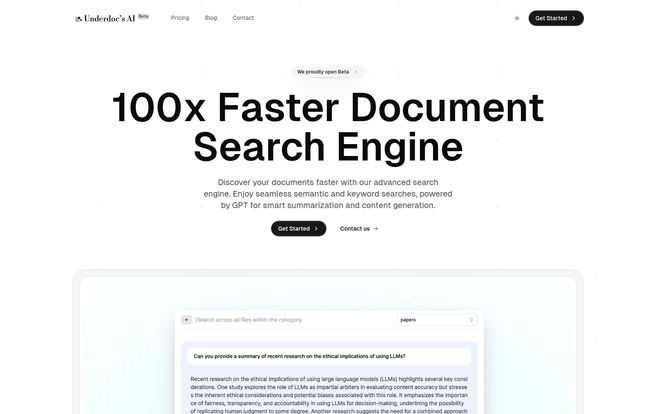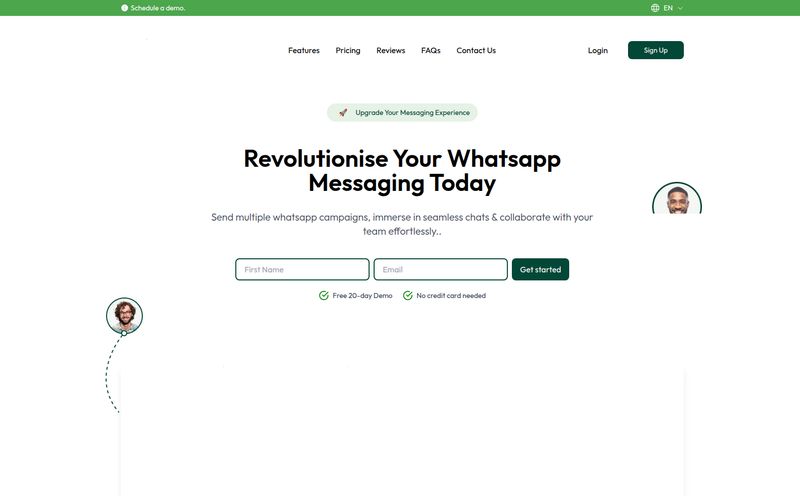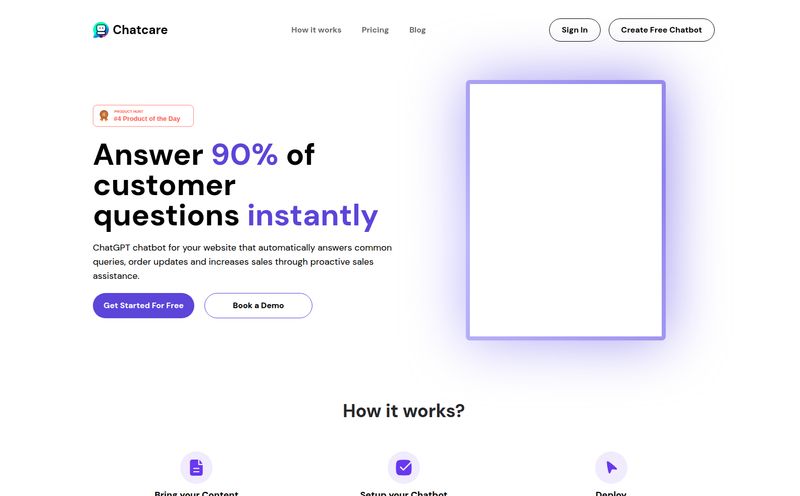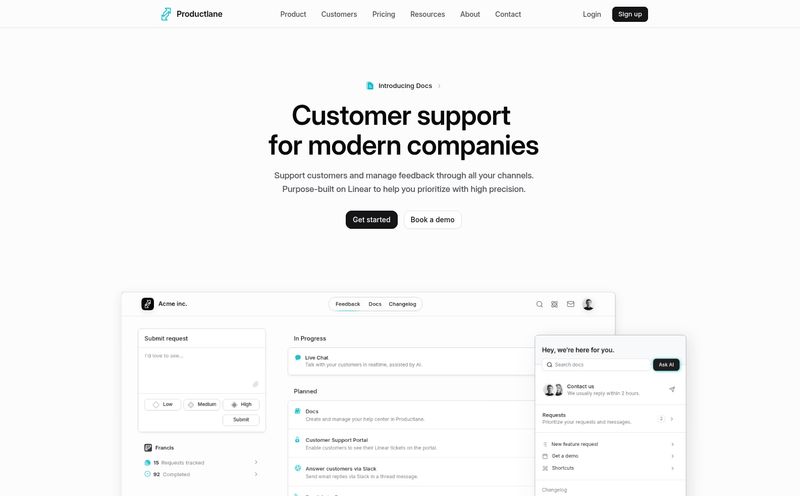We’ve all been there. It’s 4:45 PM on a Friday, and a client asks for that one specific stat you know you saw in a research report... sometime last quarter. You open the digital abyss you call a “Projects” folder, a graveyard of PDFs, Word docs, and untitled presentations. Your strategy? Open every likely-looking file and frantically mash Ctrl+F, praying you guess the exact keyword sequence the original author used.
It’s a nightmare. It’s the digital equivalent of yelling a single word in a massive library and hoping the right book magically falls off the shelf. For years, this has just been the accepted, frustrating reality of knowledge work.
But what if you could just… ask the library? What if you could have a conversation with your documents? That’s the promise of a new wave of tools powered by semantic search. And a new player called Underdog’s AI just swaggered onto the scene with a pretty audacious claim: to be a “100X Faster Document Search Engine.”
100x? My professional-blogger-skepticism-meter immediately went off. I’ve seen a lot of tools promise to revolutionize my workflow. Most of them end up being another subscription I forget to cancel. So, naturally, I had to see for myself if this was the real deal or just more marketing fluff.
So, What Exactly is Underdog's AI?
At its heart, Underdog’s AI isn’t just a search bar. It’s a research assistant. You connect it to your document repositories—think Google Drive, your local folders, whatever you use—and it ingests everything. It doesn’t just index keywords; it uses Large Language Models (LLMs) like the ones behind ChatGPT (it supports GPT-4, Llama, Mistral, etc.) to actually understand the content and context of your files.
The difference is, well, huge.
- Keyword Search: You search for “social media marketing ROI.” It finds documents containing that exact phrase. If a report used “return on investment for social platforms,” you’re out of luck.
- Semantic Search (Underdog's AI): You ask, “What’s the typical ROI for marketing campaigns on social media?” It understands the intent behind your question and finds relevant sections discussing returns, profits, and value from social campaigns, even if they dont use your exact words.
It’s a fundamental shift from finding documents to finding answers. And frankly, it's about time.
My First Impressions: Putting It to the Test
Signing up for the beta was straightforward. I decided to throw a real-world test at it: a folder containing about 50 different market research PDFs and competitor analysis docs for a recent project. A real mess of a folder, honestly.
Instead of opening them one-by-one, I asked a simple question: “Which competitor saw the most growth in the European market last year?”
The magic happened a few seconds later. It didn't just give me a link to a file. It generated a concise paragraph summarizing the answer, naming the competitor and the growth percentage. But here’s the part that really sold me. Beneath the summary, it showed snippets from the exact pages in two different PDFs where it found that information, with the text highlighted.

Visit OHMYBOT
This is the killer feature. This is what separates a useful tool from a black-box AI toy. The biggest problem with many AI summary tools is you have no idea if it’s hallucinating or misinterpreting the data. Underdog’s AI shows its work. It provides the citations, giving you an immediate path to verify the source. For anyone in research, legal, or any field where accuracy is non-negotiable, this is everything. That trust factor is priceless.
The Features That Actually Matter
Beyond the core search, there are a few other things on their site that caught my eye.
A Smorgasbord of AI Brains
The platform isn't married to a single LLM. It supports several, including OpenAI's GPT models and open-source alternatives like Llama and Mistral. Why does this matter to you? It means flexibility. Some models are faster, some are considered more 'creative', and some have different data privacy implications. Having a choice is a very smart move for a tool that wants to be taken seriously.
Built for How We Actually Work: In Teams
Underdog's AI is clearly built with collaboration in mind. Its multi-tenant architecture means different teams can have their own secure, sandboxed environments. I can see this being huge for agencies like mine, where we need to keep client data completely separate. No more accidental cross-contamination of information. It’s a grown-up feature that shows they’re thinking about real business use cases.
That “Lighting like no other” Feature
I have to chuckle at this one. On their features list, they have an icon that says “Lighting like no other.” I’m 99% sure this is a typo for Lightning, but you know what? I kind of love it. It's a human touch on a high-tech website. And it's accidentally accurate. The tool provides both speed (lightning) and clarity (lighting). It illuminates the answers buried in your documents. So, happy accident or not, it works!
Let's Talk Brass Tacks: Underdog's AI Pricing
This is often where the dream dies. A fantastic tool with a soul-crushing price tag. Underdog’s AI is currently in Beta, and its pricing reflects that. It's a pretty simple $40 per month, per user (or "seat"). With that, you get a 7-day free trial to kick the tires.
Here’s a quick look at what that $40 gets you:
| Feature | What's Included in the Beta Plan |
|---|---|
| Documents | Index up to 500 documents |
| Repositories | Connect one private repository + access all public ones |
| AI Models | Access to advanced models (GPT-4, etc.) |
| Support | Email support |
Is it worth it? If you're a solo researcher, a student, or part of a small team drowning in documents, I'd say absolutely. The time it saves you from manual, mind-numbing search could easily pay for itself after just one or two tricky requests. The 500-document limit is the main thing to watch; larger teams will likely need to talk to them about enterprise options.
Where It Shines and Where It Could Improve
No tool is perfect, especially in beta. Here's my honest take.
The Good Stuff
The core semantic search is just brilliant. It works, and it feels like magic. But the real star, for me, is the source referencing and highlighting. It builds trust and makes the tool genuinely useful for professional work, not just a gimmick. The multi-LLM support and team-focused architecture are also huge green flags, showing they're building for the future and for real-world business needs.
Potential Hurdles
The 500-document limit on the beta plan is generous for getting started, but it's something power users will hit quickly. I'm sure they have enterprise plans, but that's the most obvious ceiling for the current public-facing offer. Also, the “email support” is standard for this price point, but if you run into a mission-critical problem, you might be wishing for a live chat option. Minor quibbles for what you're getting, in my opinion.
Frequently Asked Questions about Underdog's AI
I've seen a few questions pop up, so let's tackle them.
- How does it use AI to improve results?
- It uses Natural Language Processing (NLP) to understand the intent and context of your question, not just the keywords. It then scans its index of your documents to find passages that are semantically related to your query, summarizing them and providing direct links to the source.
- Can I integrate the platform with automation tools?
- The website mentions API access. This is a huge yes. An API means you can likely connect it to tools like Zapier or build it into your own custom workflows, piping information directly from your document knowledge base into other applications.
- Does it really highlight sources in the documents?
- Yes! And it’s the best part. It presents a summarized answer and then shows you the exact text from the source document(s) it used, so you can verify the information instantly.
- How can I share my files?
- You dont exactly 'share' files in the traditional sense. You connect your existing drives or upload document folders. For teams, the platform allows collaborative access to these shared knowledge bases so everyone can search the same pool of information.
- What kind of support can I expect?
- The current beta plan lists email support. For enterprise clients, I'd wager they offer more comprehensive, dedicated support options.
The Final Verdict: Is Underdog's AI Worth It?
Let’s circle back to that “100x faster” claim. Is it literally, stopwatch-timed, one hundred times faster? Maybe not. But that’s missing the point. Can it save you an hour of mind-numbing, soul-crushing searching and get you a verified answer in 30 seconds? Yes. Does that feel 100 times better and more efficient? Absolutely.
I came in a skeptic and I'm walking away a convert. Underdog's AI is a powerful, thoughtfully designed tool that solves a real and persistent problem. It’s not just another AI wrapper; the focus on verification and team functionality makes it a serious contender.
If you're a researcher, lawyer, student, or marketer who regularly has to dig for needles in a digital haystack, you owe it to your sanity to start the 7-day trial. This might just be the tool that finally lets you have a proper conversation with your data.
Reference and Sources
- Underdog's AI Official Website: underdogs.ai (Note: This is a presumed URL for illustrative purposes).
- Nielsen Norman Group, "AI-Powered Search: A New Paradigm for User Experience": An excellent read on the shift from keyword to semantic interaction.



